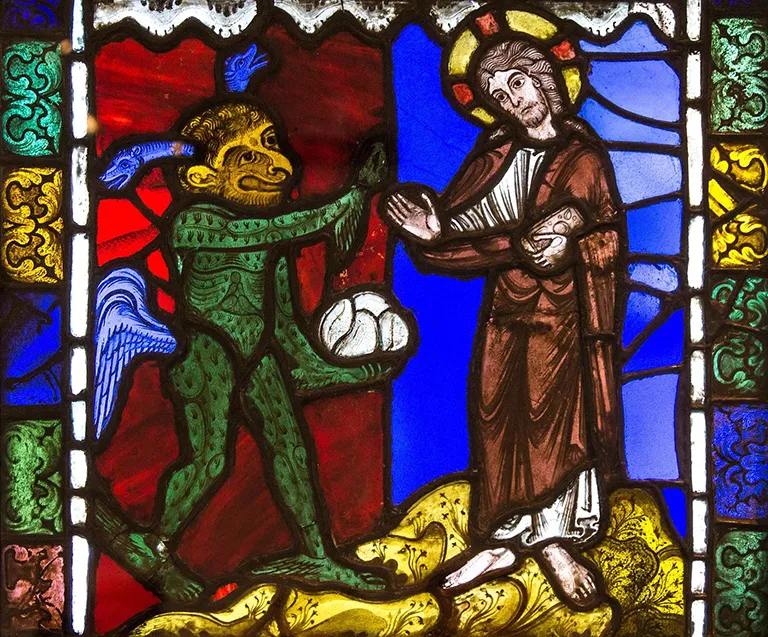When we find ourselves wanting to sin, is that something which we should repent of, confess to God, and ask forgiveness for? Or is that only necessary if we give in to that desire? What does this have to do with our temptations, and Christ’s?
The issue of concupiscence – another name for ‘sinful desire’ or ‘lust’ – has become a matter of controversy recently, partly because of its relevance to sexual sin and the question of LGBTQ+ ‘identities’, though its implications are much wider. Here, John Stevens and Matthew Roberts argue for two different views, and each responds to the other.

Matthew Roberts says...
Repentance is at the heart of Christian faith (Mark 1:15); and repentance is a matter of the heart.
That is the essence of Jesus’ criticism of the Pharisees, who thought that righteousness was merely external; they cleaned ‘the outside of the cup and the plate, but inside they are full of greed and self-indulgence’. They were like whitewashed tombs: beautiful on the outside, unclean on the inside (Matt. 23:25-28). What they did not see is that beneath all sinful acts is a heart that wants to sin; and that wanting to sin is itself sin. The unclean heart brings God’s wrath on us, and it can only be cleansed by the atoning blood of Christ. Realising and accepting that is essential to true repentance.
This truth is clear throughout Scripture. The tenth commandment, that you shall not covet, destroys our pride – as it did for Paul (Rom. 7:7-12) – because it reveals that the spontaneous desires of our hearts are themselves an offence to God. This is why David’s repentance meant acknowledging ‘in sin did my mother conceive me’ (Ps. 51:5). Before he had done anything, with his hands, lips or mind, the attractions of his heart had rendered him a sinner in God’s sight.
The Lord Himself taught the same. Anger and lust, whether we mentally ‘choose’ them or not, are terrible sins (Matt. 5:21-30). It is out of the heart that all sins come – including sins of desire, like pride and envy (Mark 7:20-23). We are sinful all the way down. And so Paul (Eph. 2:4; Col. 3:5-6), James (1:14), and John (1 John 2:15-17) speak of our desires as themselves making us guilty before God.
Repentance therefore means realising that there is no bright core of innocence in the centre of my being. I am an offence to God not only in what I have done, but in what I am. It is in giving up entirely upon my own righteousness, and fleeing to Christ alone for His, that I am saved.
This is why this question was important in the Reformation. Rome taught that each person can become righteous enough to pass God’s judgment. That is only possible if attractions to sin, which never go away in this life, leave us innocent; so that with enough effort to clean up my external actions, I can be righteous enough. But if my sinful motivations mean that even my righteous deeds are like filthy rags (Isa.64:6), that is impossible. Christ’s righteousness is my only hope. For that reason, all the Reformed Confessions said unequivocally that ‘concupiscence’ – sinful desire – has of itself the nature of sin.
But now, in part because of reluctance to regard homosexual desires as sinful, a new impetus has grown up within evangelicalism to say that sinful desire is not sin. It is not offensive to God but a mere orientation, itself neutral unless we act upon it. It is just part of my identity. It does not incur God’s wrath, and it need not be atoned for.
The attraction of this is the same as that of the Roman view: it makes it possible to believe that my standing before God is built, at least in part, on my own innocence. As long as I don’t act on sexual lusts, I don’t need to rest on Christ’s blood and righteousness to atone for them. I can believe the secular account of ‘sexual orientation’ as an intrinsic, and morally insignificant, part of my nature. And so, rather than grieving over my distorted sexual urges, asking forgiveness for them, and seeking to put them to death in the power of the Spirit, they can be accepted, made peace with, spoken of without shame, perhaps even celebrated.
The main argument used to justify this view is that since Christ was tempted as we are, yet without sin (Heb. 4:15), temptation itself must not be sinful, and therefore sinful desire not sinful either. But this is to confuse temptation with sinful desire. Sinful desire is one source of temptation – coming from inside us – while there are others (the world and the devil) which are outside us. Jesus, emphatically, did not ever desire to sin. He loved (and still loves) His Father with all of His heart and soul and mind and strength. The suggestion that He lusted for sex, or money, or sinful pleasure or glory, is blasphemous and would destroy salvation at the roots. He was never (in the words of James 1:14) lured and enticed by His own desire. That is why the Devil, in tempting Him, had to appeal to His righteous inclinations: for food, the love of His Father, being king of the world. The Devil tried to use these to generate an attraction in Him to sin; Jesus never once gave in. He resisted temptation at a level far deeper than us. It is the very purity of our Lord’s heart in the face of temptation which means that His blood is able to cleanse our corrupt hearts.
Thus the issue for us is this. Is my plea before God based partly on my innocence? Is the Christian’s security before God, when troubled by the knowledge of his sinful nature, established partly on the belief that God is not troubled by a sinful heart? Is my comfort, when I find myself wanting to do evil, that God does not mind this as long as I don’t give in?
Or is it rather that Christ has atoned for all of my sin – lips, hands and heart – by His absolute moral purity? That the wrath of the thrice-holy God is righteously directed towards creatures whose unclean hearts lust for evil, but in His mercy He has turned aside His wrath onto His perfectly clean Son? That Christ by His blood can and will save me, unclean as I am, from the guilt and the power of sin at every level of my being? This is the true gospel; the other is not.
To say that the desire to sin is not sin is to destroy true repentance. In the name of Christ, our perfect Lord and Saviour, let us not make peace with our sinful attractions and desires and fall back into the external righteousness of the Pharisees.
John Stevens responds...
Thank you for setting out your position with clarity and passion. We both share a concern that Christians should fight against the evil desires they experience.
I think you see dangers in my position that do not reflect what I believe. I don’t suggest we accept or make peace with our sinful desires. We are called to fight them in the power of the Spirit. The New Testament uses language of abstaining, mortifying, not gratifying and not indulging. I see this as living out the definitive repentance that took place at our conversion.
I do not think my view is a response to homosexuality. Older generations of evangelicals such as Spurgeon, Ryle and Lloyd Jones taught that evil desire is temptation, not sin, without any reference to homosexuality, and saw no contradiction between their teaching and the Confessions they subscribed to (Baptist 1689, Thirty-Nine Articles, Savoy Declaration).
I do not think my view means that we rely in any degree on our own innocence for our standing with God. We were justified at conversion by faith alone and then live from that new secure standing. Nothing we do adds to it. All we do is the work of God in us, and the glory goes to Him.
At root I am not convinced by your exegesis of key texts. Colossians 3:5-6, James 1:14 and 1 John 2:5-17 say the desires of our flesh are evil, but do not say we are guilty because of them. Ephesians 2:3 speaks of our pre-conversion state when we were gratifying the desires of our sinful nature. In Psalm 51 David is clearly repenting for his actual sins of adultery and murder. In 1 John 2:9-22 it is our ‘sins’ we are to confess. I am not convinced that ‘coveting’ refers to spontaneous desires of our hearts, but to a deliberate mental appropriation of what belongs to someone else.
I don’t think the position you take adequately reflects the consequences of our conversion and regeneration on our nature and identity. You say we have a heart that ‘wants to sin’. This was true of our fallen selves, but is not the whole picture now we are in Christ. We have been given new hearts that want to please God, yet we also retain our corrupt flesh which is the seat of indwelling sin. Jesus’ teaching in Mark 1:15 and Matthew 23:25-28 is directed to unregenerate Pharisees who, like Nicodemus, need to be born again. The flesh/spirit old-self/new-self conflict is only true of those who live under the New Covenant. Isaiah 64:6 speaks to those who have not repented in an Old Covenant context.
My view is not primarily based on an understanding of Jesus’ temptations as you suggest, thought that does support it. I agree that Jesus did not experience evil desires. However, I think Scripture testifies that Jesus experienced internal struggle in His human nature to resist the lure of good desires to avoid suffering. Otherwise, it is hard to see how Jesus was tested in any real sense.
Your view seems to require every Christian to live in a continual state of grief and shame since we all have desires that come from indwelling sin. For me the New Testament envisions a Christian life of joy and victory over sin, even in the midst of continual battle against the desires of our flesh. In Christ we are saints, not sinners. We are new creations, not our former selves.

John Stevens says...
I want you to consider all the evil desires or thoughts you have had today.
Perhaps you have felt a flash of anger towards someone, a greedy desire for more than you need to eat, a desire to own someone else’s car, or a sexual attraction towards someone to whom you are not married. Perhaps these desires arose from external stimuli or circumstances, or perhaps they seemed to come to your mind from nowhere. What did you do with these desires? Did you immediately dismiss them, or did you entertain them, dwell on them or indulge them? Did you carry them into action?
If you resisted and rejected them, how are you supposed to feel about them and yourself? What do you need to do before God? Have you sinned so that you need to repent and confess? Or have you experienced victory over sin so that you can rejoice in God’s grace to you that He has kept you from sinning?
How we understand our sinful desires is the central issue at stake in the disagreement between evangelicals about the doctrine of ‘concupiscence’. Are such desires already sins, or are they temptations we are called to resist? This question needs to be answered from Scripture and concern the very nature of our salvation and what the death and resurrection of Christ has achieved.
My view is that the New Testament teaches that unwanted sinful desires we experience but resist are not sins that need to be repented. There is nothing in the epistles that would suggest this is the case, and much that points the other way.
The New Testament describes the normal Christian life as a continuous inner struggle between competing desires. As fallen-but-regenerate people, new creations in Christ indwelt by the Holy Spirit, we experience a conflict between the desires of our fallen flesh and the desires of our new self. The Holy Spirit enables and empowers us to put these desires to death, so that we do not carry them into action. We mortify our desires, experiencing the liberation from the reign of sin which enslaved us to its passions before we were converted.
This is the way that Paul describes the normal Christian life in Romans, especially chapters 6–8. When we were unbelievers, we were guilty before God because of our sinful nature and our sinful actions. As a result of our faith-union with Christ, we have died with Him and been raised with Him. We are new selves, justified by faith alone, redeemed and liberated from sin, which is pictured as a master that ruled over us. Whereas before conversion we habitually gratified the sinful desires we experienced, now we mortify them and use our bodies as instruments of righteousness, loving and serving God and others.
Whilst we have been set free from sin, we continue to live in our fallen bodies, which belong to this present evil age. We no longer have wicked hearts in the way that we did before conversion. The great blessing of the New Covenant is a new heart, and God has written the law on our hearts by his Spirit (Ezek. 36:26; Jer. 31:33). However, we continue to have to live with our fallen flesh and will not be set free from it until we die, when it will be destroyed and our bodies resurrected and glorified. In Romans 7:17 Paul places the blame for this struggle squarely on ‘Sin’, which indwells his fallen flesh. It is like an alien interloper. He laments the fact that he has to endure this permanent struggle because he lives in a ‘body of death’ (Rom. 7:24) but takes great hope in Romans 8 in the power of Spirit to enable him to resist the pull of this indwelling sin until final liberation comes with the redemption of all things at the new creation.
Paul articulates a very similar understanding of the Christian life in Galatians 5:13-25, which similarly speaks of an inner struggle in the believer between the desires of the flesh and the Spirit. In Colossians and Ephesians, he uses a slightly different metaphor, and speaks of the Christian life as a conflict between the old fallen self that existed prior to conversion and the new self created by Christ (Eph 4:20-24; Col. 3:5-11). He expects the new self to enjoy victory over the desires of the old self. Peter similarly describes the Christian life as a war against sinful desires (1 Peter 2:11). James says we are tempted by our evil desires (James 1:4) and John warns us against the temptations of the flesh, the world and the devil. None of these apostles suggests that those who overcome the sinful desires they experience has sinned, that they should feel guilt and condemnation because of their experience, nor that they need to repent or confess. Instead, they have enjoyed the victory over sin that the gospel wonderfully promises. If they allow their desires to become actual sins they must, of course, confess and repent to receive forgiveness and cleansing (1 John 2:1-2).
This bigger picture encourages us to categorise the unwanted sinful desires we experience as temptations rather than sins. James 1:4 makes this explicit. Jesus likewise shows us that temptation is not sin. Whilst His temptations were external, because He did not have a fallen flesh, the principle is the same. He was tempted as we are, but did not sin. As a result of our regeneration, our flesh is not who we really are in Christ and is experienced as a form of external temptation.
Whilst other evangelicals have reached a different conclusion, this is why many respected pastors, including C.H. Spurgeon, J.C. Ryle, Martyn Lloyd-Jones and John Stott, have taught that experiencing sinful desire is not the same as sinning and does not require renewed repentance and confession. This has long been a mainstream view within evangelicalism. It was recently adopted by the Doctrine Commission of the Diocese of Sydney, which examined the Anglican doctrine of concupiscence and concluded that sinful desires are to be resisted, but do not require repentance.
This seems to me to reflect the Biblical teaching, and we need to celebrate the many daily victories we enjoy over indwelling sin as we live under grace as justified regenerate believers, rather than bearing a burden of unnecessary shame and failure for temptations we have not sought, wanted nor indulged.
Matthew Roberts responds...
I appreciate John’s concern to emphasise Christ’s victory over sin, and to help us battle against sinful desires. Nevertheless, I fear that his view has the opposite effect.
It seems to have three parts. First, that sinful desires are not my desires at all, but belong to my old self which is an ‘alien interloper’ – so it, not me, is responsible for them. Second, Jesus’ temptations show that sinful desires are not sins – ‘the principle is the same’, he says. Third, in an echo of Wesleyan perfectionism, John appears to think that as a regenerate person I can genuinely avoid sin. If I act on sinful desire, then I will need to repent and receive forgiveness again. But the victorious Christian life seems to mean being innocent before God for the majority of the time.
But none of these things is justifiable from Scripture. Never does Paul suggest that I’m not responsible for my old self because it’s not me. On the contrary, he says sin produced ‘in me’ all kinds of covetousness (Rom.7:8), just as James says we are lured and enticed by our own sinful desire (James 1:14). Since Paul also ascribes our sinful actions to ‘sin’ (Rom. 7:20), John’s view would mean (though he doesn’t intend this) that we’re not responsible for our sinful acts either!
As for Christ’s temptations, the principle is not the same! That Christ, unlike us, was not tempted by His own sinful desire is essential to our salvation. He can redeem our unclean hearts because His heart remained utterly clean. To confuse the two here is to risk ascribing sin to Christ and denying His ability to save us.
And thirdly, Christians in this life remain sinners, and sin even in our best deeds, because we are polluted by our evil desires. Of course we should thank God for the wonderful way He helps us resist our attractions to sin. But that does not mean we can account ourselves righteous. Our only righteousness is Christ Himself.
John’s view, if followed through, has two very bad results.
First, it means that my saviour is no longer only Christ, but also me. The guilt of my sin – both my acts and my desires – is wholly imputed to Christ; that is why there is no condemnation for those in Him. But in John’s view part of my guilt is instead imputed to a supposed old ‘me’, so separate from me that by him – not Christ – taking the blame, I am left innocent.
And second, the motivation to battle sin at its root is lost. If sinful inclinations leave me innocent, why should I want to be rid of them? Why should I seek to kill (Col.3:5) what God does not hate? Why not instead make peace with them? Like some shiny gym equipment in the basement of my soul, I can rejoice in them, since by providing resistance training they lead to achievement and victory. Lest anyone think this is far-fetched, this is exactly what is being said by some writers in the evangelical ‘gay Christian’ movement.
So, ignoring Scripture’s teaching that the desire to sin is itself sin – however well-meaning – does not emphasise but lessens Christ’s victory; it detracts from Christ’s purity and His atoning death; and it leads to apathy in our fight against our sinful flesh.
John & Matthew conclude...
As is evident from our articles and responses, it is clear that we disagree about concupiscence and how to understand the sinful desires we experience as Christians. However we disagree as brothers in Christ, we recognise that this is an important issue, both theologically and pastorally, and one on which contemporary evangelicals take strongly held positions. As we hope is clear, we both believe it is essential to fight indwelling sin, and we both find our final authority in Scripture. Rather than minimising such disagreements in the interests of a superficial unity, we feel it is better to engage in honest dialogue that seeks to identify and better understand where we disagree, and why. We have tried to model a gracious disagreement, and have both benefitted from the opportunity to engage with one another and clarify our positions. We are very conscious that we can only scratch the surface of the subject with tight word limits, but we hope that our combined efforts have helped readers to understand the issues and our different approaches.
Further reading…
We have both written more extensively on the subject elsewhere. John’s view is set out in The Fight of Your Life: Facing and Resisting Temptation (Fearn: Christian Focus, 2019), and several articles on his blog deal with the nature of sin and temptation. Matthew addressed the issue in relation to sexual sin in Pride: Identity and the Worship of Self (Fearn: Christian Focus 2023), and more generally in ‘The Pastoral Value of the Reformed Doctrine of Concupiscence’, Ad Fontes, February 2024, available online.







